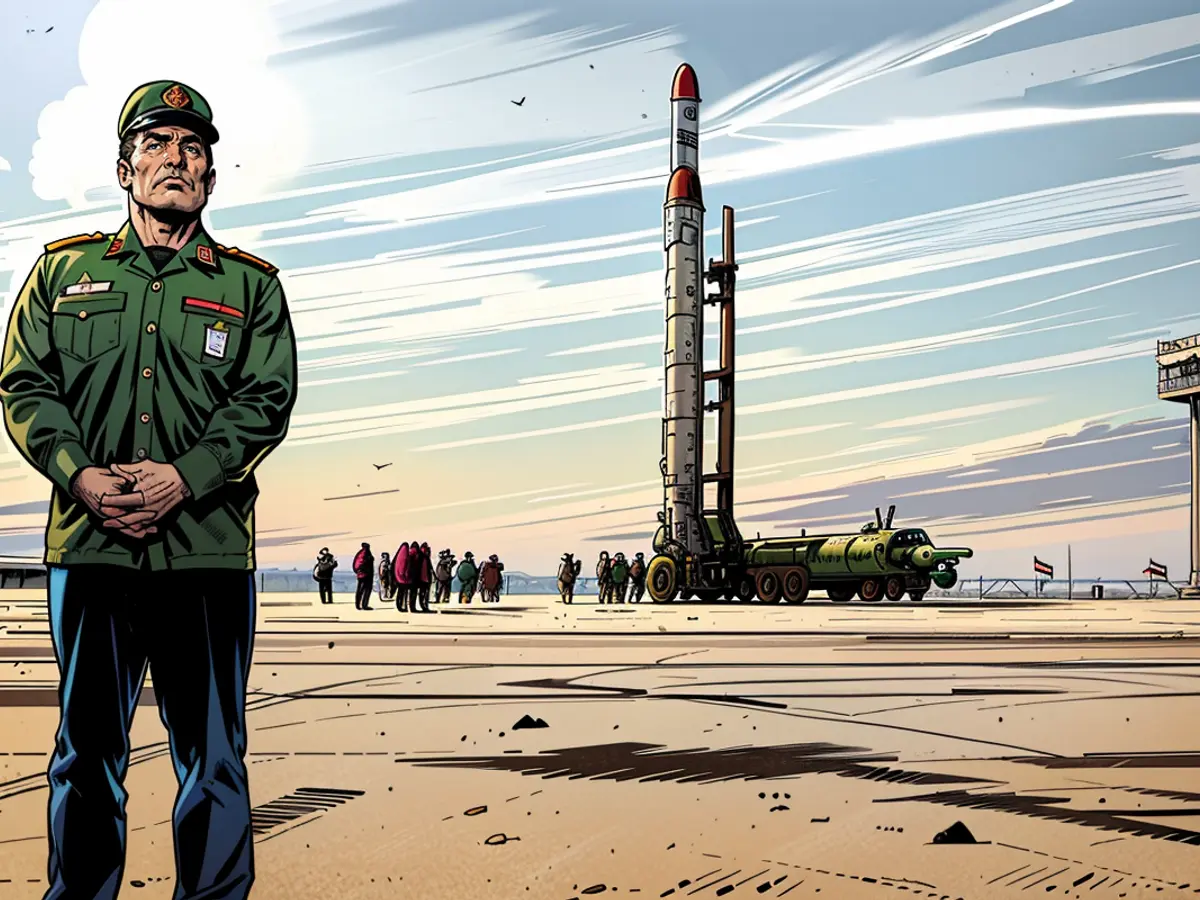- Fear of a New Middle East War
Facing the threat of retaliatory strikes from Iran and its allies against Israel, the USA is making a last-ditch effort to prevent a major war in the Middle East. "We're conducting almost round-the-clock intensive diplomatic talks with a simple message: All parties must refrain from escalation," said US Secretary of State Antony Blinken after a meeting with his Australian counterpart Penny Wong in Washington. The exact timing of the widely anticipated attack on Israel remains unclear, but media reports suggest it could be imminent.
US President Joe Biden convened with his security team in the Situation Room of the White House. He and Vice President Kamala Harris were briefed on the threat level, de-escalation efforts, and preparations to support Israel in case of an attack, Biden later announced on the X platform. Measures were also discussed to defend US forces in the region and respond to any attack on US personnel "in a manner and place of our choosing."
Pentagon: US soldiers injured in Iraq attack
Several US soldiers were injured in an attack on a military base in Iraq, the Pentagon initially reported. A spokesperson for the US Department of Defense said that the airbase of Al-Asad, used by US troops and partners, was reportedly hit by a rocket.
Since the start of the Gaza war between Israel and the Islamist Hamas, militias allied with Iran have repeatedly attacked US military bases in Iraq and Syria. US Secretary of Defense Lloyd Austin and his Israeli counterpart Joav Galant agreed in a joint call that the attack was a "dangerous escalation" and highlighted the destabilizing role of Iran in the region, a Pentagon spokesperson later stated.
Iran and its allies in the region have threatened to harshly punish Israel for the killing of Hamas' external operations chief Ismail Haniyeh in Tehran and Hezbollah commander Fuad Shukr in Beirut last week. In response, the Pentagon said the US is deploying additional ships and combat aircraft to the region. General Michael Erik Kurilla, commander of US forces in the Middle East, met with Israeli Chief of Staff Herzi Halevi in Israel.
According to the Israeli military, the meeting also discussed "joint preparations" to counter threats in the region. Israeli Defense Minister Joav Galant said during a visit to the underground command center of the air force in Tel Aviv that the military must prepare for all possibilities, including a "quick transition to the offensive."
Report: Russia begins delivering air defense equipment to Iran
Russia has begun delivering modern radar systems and air defense equipment to Iran, according to a media report. The New York Times, citing two Iranian officials familiar with war planning, reported that Iran had previously requested modern air defense systems from Russia in preparation for a possible war with Israel. The delivery has started, the report said, following talks between the secretary of Russia's Security Council, Sergei Shoigu, and senior Iranian officials in Tehran.
Moscow maintains close ties with Tehran but also has contacts with Israel. The Russian government called on all sides to exercise restraint.
Given the impending attack on Israel, aircraft with Jordan as their destination are being prepared for a possible route change. All incoming flights must be pre-fueled with enough fuel for an additional 45 minutes of flight time, according to a security notice from Jordan's civil aviation authority. In case of an attack, they would have enough fuel to change their route at short notice and land in a neighboring country. The notice from Jordan's authority is valid until midnight tonight (MEZ).
In April, Iran directly attacked Israel for the first time. During the attack, which involved more than 300 drones, rockets, and cruise missiles, Jordan was the first country in the region to close its airspace.
The German Armed Forces are prepared for a large-scale operation to evacuate German citizens. Transport aircraft of the type A400M and soldiers are being held ready at the airbase in Lower Saxony, Wunstorf, and can be deployed at short notice, as explained to the German Press Agency. The navy is also making preparations. The operation could mainly involve the evacuation of Germans who have remained in Lebanon despite repeated calls to leave.
Meanwhile, Iran wants to consult with other Islamic countries about the killing of Hamas' external chief, Haniyeh. For this purpose, an urgent meeting of the Organization of Islamic Cooperation (OIC) at the level of foreign ministers is planned in Saudi Arabia on Wednesday, where the OIC is based. At the meeting in Jeddah, it is to be discussed the "crimes of the Israeli occupation," including the "assassination" of Haniyeh, the OIC announced, which consists of 57 Islamic countries.
Iran and Hamas hold Israel responsible for Haniyeh's killing last week. Israel has not yet commented on this.
US President Biden is making efforts to de-escalate the situation. In a telephone conversation with Jordan's King Abdullah II, the two discussed their efforts to de-escalate tensions, including through the mediation of an agreement on an immediate ceasefire in the Gaza Strip and the release of hostages held by Hamas, the White House announced.
Indirect negotiations between Israel and Hamas on such an agreement have been deadlocked for months. Since both sides do not negotiate directly with each other, the US, Egypt, and Qatar are mediating. A further round of talks between an Israeli delegation and Egyptian officials in Cairo over the weekend ended without results, as reported by Israeli media.
The negotiations will only be resumed once Iran has avenged Haniyeh's killing and Hamas has chosen a successor for the slain external chief, two officials familiar with the matter told "Times of Israel". Haniyeh was one of the main negotiators of Hamas in the indirect talks on a ceasefire and the release of hostages.
The European Union, as a key international player, has expressed concern over the escalating tensions in the Middle East and urged all parties to exercise restraint and avoid actions that could lead to further escalation. In response to the reports of potential attacks, European Union foreign policy chief Josep Borrell held a meeting with his counterparts from the United States, Russia, and other regional powers to discuss a collective approach to de-escalate the situation and promote peace and stability in the region.






